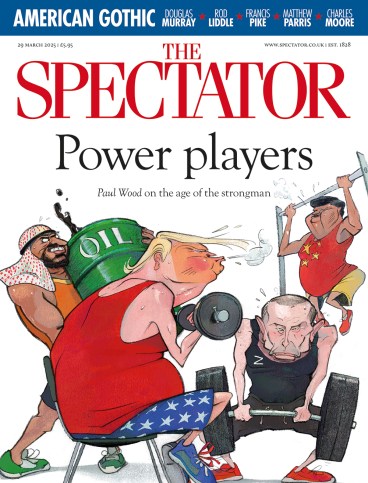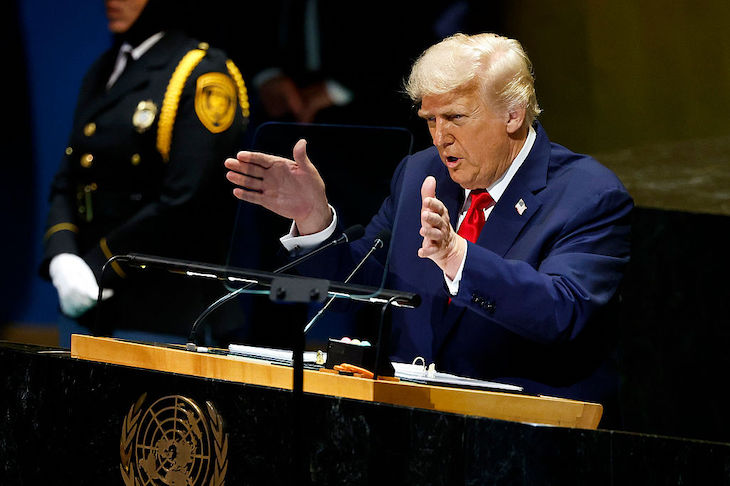
The Digital Services Tax (DST) is a relatively easy bargaining chip to give away in a last-ditch bid to appease Donald Trump, whose final menu of tariffs on UK exports to the US is expected imminently. First tabled by Philip Hammond as chancellor in 2018 and enacted by his successor, Sajid Javid, two years later, this 2 per cent levy on tech multinationals with more than £25 million of UK digital revenues was always seen as a raid on the likes of Apple, Amazon, Netflix, Google, Meta and Microsoft, though it must by now also catch Shein and other Chinese operators – and was always a provocation to the White House.
Within months, there were rumours that Boris Johnson’s government was ready to scrap DST to secure a longed-for UK-US trade deal. Even now, it contributes only £800 million a year in revenue to HM Treasury, while total UK exports to the US exceed £180 billion. Chancellor Rachel Reeves and Ambassador Peter Mandelson have both let slip that it’s up for discussion. After all, why not curry a bit of favour by slipping the tech bros a handy rebate, some of which might even find its way into Republican midterm campaign coffers?
But the answer to ‘why not’ is one of simple principle. When DST was mooted in London, Brussels and elsewhere in the late 2010s, tech giants were collectively reckoned to be paying less than half the taxes they might have paid at ‘headline’ rates wherever they operated. In the EU, terrestrial businesses paid 23 per cent while digital players, shifting much of their profit to offshore havens, paid no more than 9 per cent. The global shortfall of tax paid by top US tech firms over the decade was upwards of $150 billion.
What Trump’s people saw as unfair targeting of great American companies was in truth a response to blatantly unfair competition: digital monsters crushing local businesses and shifting tax burdens on to local taxpayers, or leaving them with underfunded and failing public services. Global corporate tax harmonisation, as promoted by the OECD, has always been a pipe dream; but the principle that companies should pay fair taxes everywhere they make profits is valid and important. It may have to be parked for the duration of the Trump terror – but let’s hope to see it reclaimed when he’s gone.
Sci-fi cyber-evil
First there was Vladimir ‘Should’ve gone to Specsavers’ Motin, the Russian master of Solong, a container vessel which T-boned the tanker Stena laden with jet fuel in North Sea waters off Hull on 10 March. Cruising at a leisurely 15 knots, Solong should have had ample time to change course when the 183-metre tanker popped up on radar long before it loomed out of the morning fog. What Motin was doing at the time will no doubt emerge in his trial next January for gross negligence manslaughter in relation to the loss of one of his Filipino crew.
Then there was Thomas ‘Wake me up when it’s over’ Woldbye, the £3.2 million-a-year Danish chief executive of Heathrow who went to bed in the early hours of last Friday morning after fire in a nearby sub-station caused catastrophic loss of power, leaving his deputy to decide to close down the entire airport – and leaving hanging the question of whether there might have been sufficient back-up power to avert the closure if management had been wide awake.
An inquiry into the Heathrow fiasco will follow and at least Woldbye had the decency to say ‘No comment’ when asked on the Today programme whether he should stay in his job. But what connects these two incidents is the readiness of conspiracy theorists to suggest – and let’s face it, the actual possibility – that they might both somehow have been the work of Russian or other malevolent cyberhackers.
The KonBriefing online database lists 17 known cyber attacks on energy installations and 19 on logistics facilities around the world in 2024 – and no fewer than 86 in all categories, chiefly aimed at public-sector functions, so far this month alone.
Maybe Solong’s watch officers were busy playing video games and maybe a rat ate through a vital cable at the North Hyde substation. Or maybe the sci-fi cyber-evil of screenwriters’ imagination has migrated to make reality even darker and more dangerous than we thought.
Butt-kicker
Howard Lutnick, Donald Trump’s Com-merce Secretary, is under fire for amplifying confusion around the President’s tariff policies while declaring, in more or less the same breath, that there isn’t going to be a recession but if there is it will be ‘worth it’ – and it will all be Joe Biden’s fault anyway. No titan of economics, then, as even the interviewers of the usually Trump-loyal Fox News seem to have spotted. But is he an OK kind of guy?
Lutnick made his name and fortune running Cantor Fitzgerald, the broking and trading conglomerate that lost 658 staff, two-thirds of its New York workforce, in the 9/11 attack on the World Trade Center. For all the financial support Lutnick and the company later provided to victims’ families, and his personal record of philanthropy elsewhere, he will forever be remembered for his decision in the immediate aftermath to stop the paychecks of the presumed dead while their loved ones were still hoping they might be found alive.
‘I needed my bankers to know that I was in control,’ he said a few weeks later, ‘… that I was no less motivated or driven to make my business survive.’ In the same interview, he talked about not letting grief and sadness overcome the urge to ‘kick our competitors’ butt’. Might those quotes give an unduly harsh impression?
I checked Lutnick’s reputation with two senior London money-market men who witnessed his Wall Street ascent. ‘An aggressive, ambitious bully,’ said one, ‘just awful’. ‘Long spoon,’ warned the other succinctly. But how perfectly suited to the front row of the Trump team.








Comments